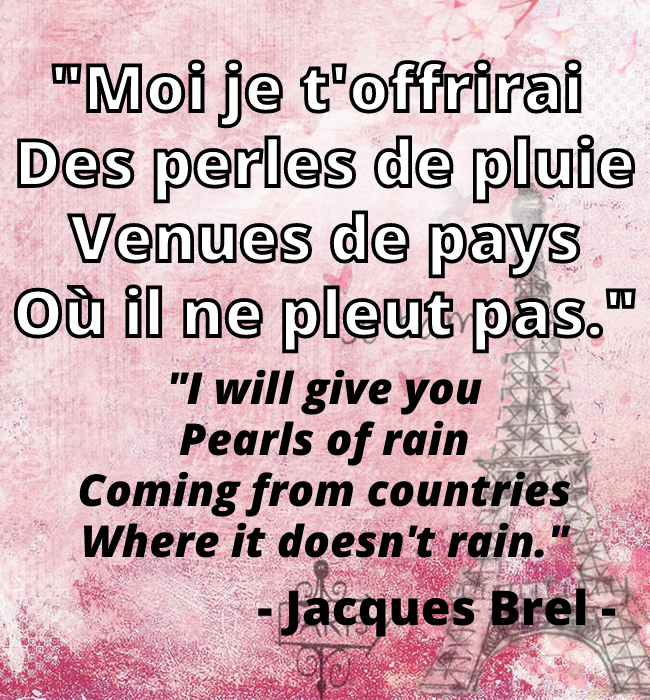“Ne Me Quitte Pas“ is Belgian singer Jacques Brel’s single most famous song. Brel first released the song in 1959 and released an album with the same title in 1972. The meaning of “Ne Me Quitte Pas” is “Don’t leave me” or “Do not leave me”. This post provides line-by-line explanations of the lyrics’ vocabulary and grammar.

Song overview
The lyrics of Ne Me Quitte Pas are sorrowful in nature. In the lyrics, Brel begs for his lover not to leave him by repeatedly crying “Don’t leave me!” and creating poetic images of attracting forces in nature.
Brel wrote the song after a breakup with his lover Zizou (Suzanne Gabriello) following the disagreement over a pregnancy. The song has been performed by countless other artists in many other languages.

Listen to Ne Me Quitte Pas On YouTube & Spotify
Listen to the song and follow along with the French and English lyrics above.
Listen on Spotify
Here you can listen on Spotify:
Lyrics analysis
French verb quitter meaning
The French verb quitter has two main definitions: to leave a place and to leave a person. For example, ‘Je quitte Paris’ means ‘I am leaving Paris’. ‘Je quitte ma femme’ means ‘I am leaving my wife’.
In the context of the song title, the meaning of ‘Ne me quitte pas’ is ‘Don’t leave me’. The phrase is in the imperative (commanding tense).
Il faut tout oublier
Translations of ‘il faut + infinitive’ include it’s necessary to, you have to, one has to. In this context of of these songs lyrics, ‘Il faut tout oublier’ can translate to either ‘you / we have to forget everything’.
This page covers the meanings of il faut in detail with example sentences.
Je creuserai la terre
‘Je creuserai la terre’ translates literally to ‘I will dig the earth’. The translation of creuser is to dig. However, creuser translates loosely to ‘work the land or earth’ in the context of these song lyric as Brel expresses that he’ll ‘work the land until after his death to cover her body in gold and light’.

Je t’inventerai des mots insensés
In the above lyrics translation, we translated ‘Je t’inventerai des mots insensés’ to ‘For you I will make up incredible words’.
The French adjective insensé translates to insane, mad or crazy. However, a French-to-French definition is ‘incroyable’. Hence, we feel that ‘incredible’ works well with our translation.
Le rouge et le noir ne s’épousent-ils pas?
The line, ‘Le rouge et le noir ne s’épousent-ils?’ translates literally to ‘The red and the black, don’t they marry or mold to each other’.
Using the definition of épouser on wordreference.com, we translated s’epouser to ‘fuse’: The red and the black, do they not fuse together?’
Je ne vais plus pleurer, je ne vais plus parler
The lines, ‘Je ne vais plus pleurer, je ne vais plus parler’ translate to ‘I am not going to cry anymore, I am not going to speak anymore’.
The most basic rule for French negation is to wrap ne…pas around the verb. For example, ‘Je ne mange pas’ means I don’t eat.
In this situation, ‘ne + verb + plus’ means ‘anymore’. This page on our site covers the French negation rules in detail.

Ne me Quitte Pas Lyrics French lyrics & English translation
Ne me quitte pas
Il faut oublier
Tout peut s’oublier
Qui s’enfuit déjà
Oublier le temps
Des malentendus
Et le temps perdu
A savoir comment
Oublier ces heures
Qui tuaient parfois
A coups de pourquoi
Le cœur du bonheur
Ne me quitte pas
Ne me quitte pas
Ne me quitte pas
Ne me quitte pas
Don’t leave me
We must forget
All can be forgotten
That has already disappeared
Forget the time
Of misunderstandings
And the wasted time
To know how
To forget these hours
Which sometimes killed
The blows of why,
The heart of happiness
Do not leave me
Do not leave me
Do not leave me
Do not leave me
Moi je t’offrirai
Des perles de pluie
Venues de pays
Où il ne pleut pas
Je creuserai la terre
Jusqu’après ma mort
Pour couvrir ton corps
D’or et de lumière
Je ferai un domaine
Où l’amour sera roi
Où l’amour sera loi
Où tu seras reine
Ne me quitte pas
Ne me quitte pas
Ne me quitte pas
Ne me quitte pas
I will give you
Pearls of rain
Coming from countries
Where it doesn’t rain
I will work the land
Until after my death
To cover your bosom
With gold and light
I will create an area
Where love will be king
Where love will be the law
Where you will be queen
Do not leave me
Do not leave me
Do not leave me
Do not leave me
Ne me quitte pas
Je t’inventerai
Des mots insensés
Que tu comprendras
Je te parlerai
De ces amants-là
Qui ont vu deux fois
Leurs cœurs s’embraser
Je te raconterai
L’histoire de ce roi
Mort de n’avoir pas
Pu te rencontrer
Ne me quitte pas
Ne me quitte pas
Ne me quitte pas
Ne me quitte pas
Don’t leave me
For you I will make up
Incredible words
That you’ll understand
And I’ll tell you
About lovers
Who saw their
Hearts embrace two twice
I’ll tell you about
The story of a king
Who died from from having not
been able to meet you you.
Don’t leave me
Don’t leave me
Don’t leave me
Don’t leave me
On a vu souvent
Rejaillir le feu
D’un ancien volcan
Qu’on croyait trop vieux
Il est paraît-il
Des terres brûlées
Donnant plus de blé
Qu’un meilleur avril
Et quand vient le soir
Pour qu’un ciel flamboie
Le rouge et le noir
Ne s’épousent-ils pas
Ne me quitte pas
Ne me quitte pas
Ne me quitte pas
Ne me quitte pas
We’ve often seen
Flames flowing from an
Ancient volcano
That one thought to be too old
There exists, it seems
Scorched fields
That yield more wheat
Than the best of April
And when the evening comes
A fiery sky
The red and the black
Do they not fuse together
Don’t leave me
Don’t leave me
Don’t leave me
Don’t leave me
Ne me quitte pas
Je ne vais plus pleurer
Je ne vais plus parler
Je me cacherai là
A te regarder
Danser et sourire
Et à t’écouter
Chanter et puis rire
Laisse-moi devenir
L’ombre de ton ombre
L’ombre de ta main
L’ombre de ton chien
Ne me quitte pas
Ne me quitte pas
Ne me quitte pas
Ne me quitte pas
Don’t leave me
I won’t cry anymore
I won’t speak anymore
Will hide
Watching you
Dancing and smiling
And listening to you
Singing and then laughing
Let me become
The shadow of your shadow
The shadow of your hand
The shadow of your dog
Don’t leave me
Don’t leave me
Don’t leave me
Don’t leave me

